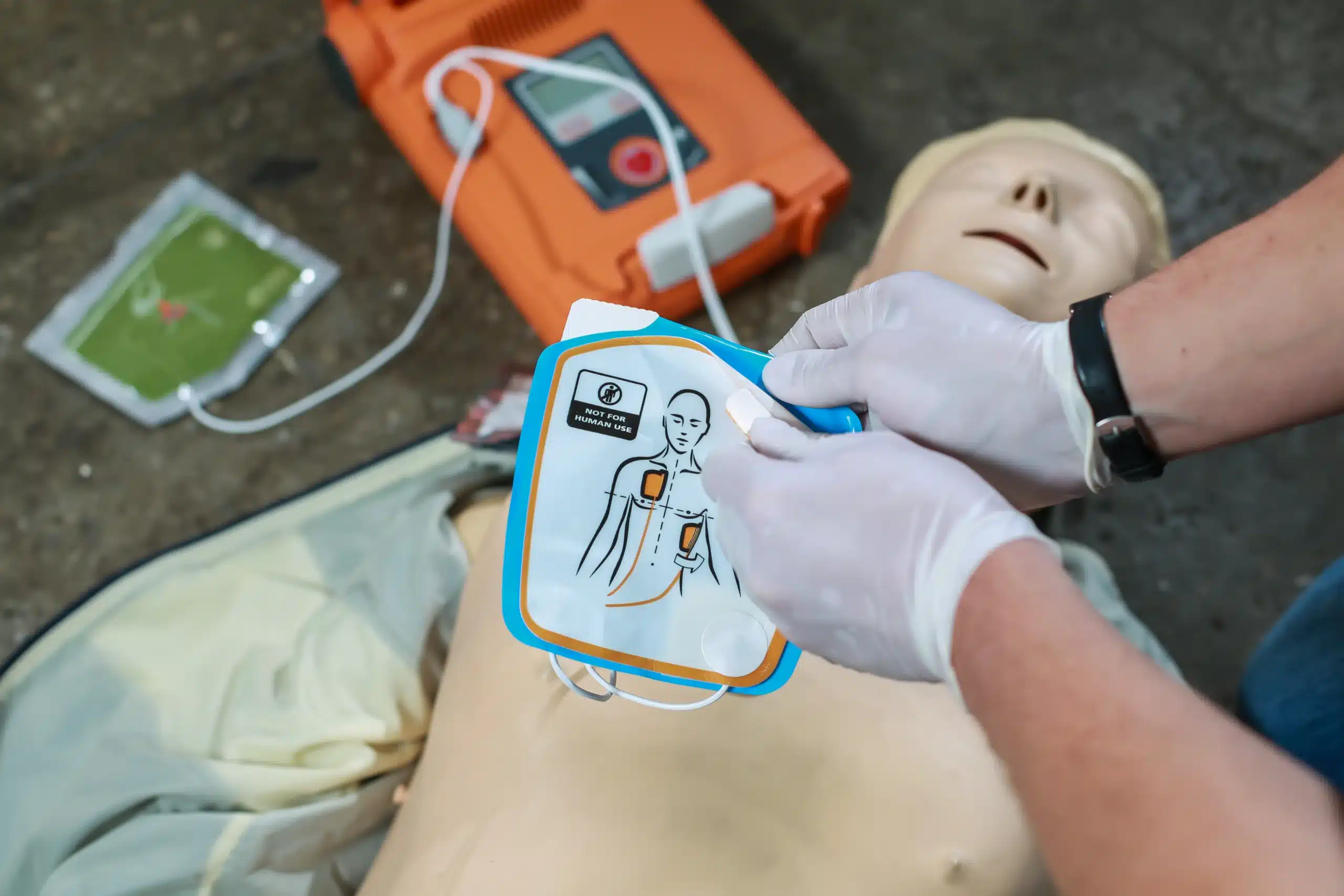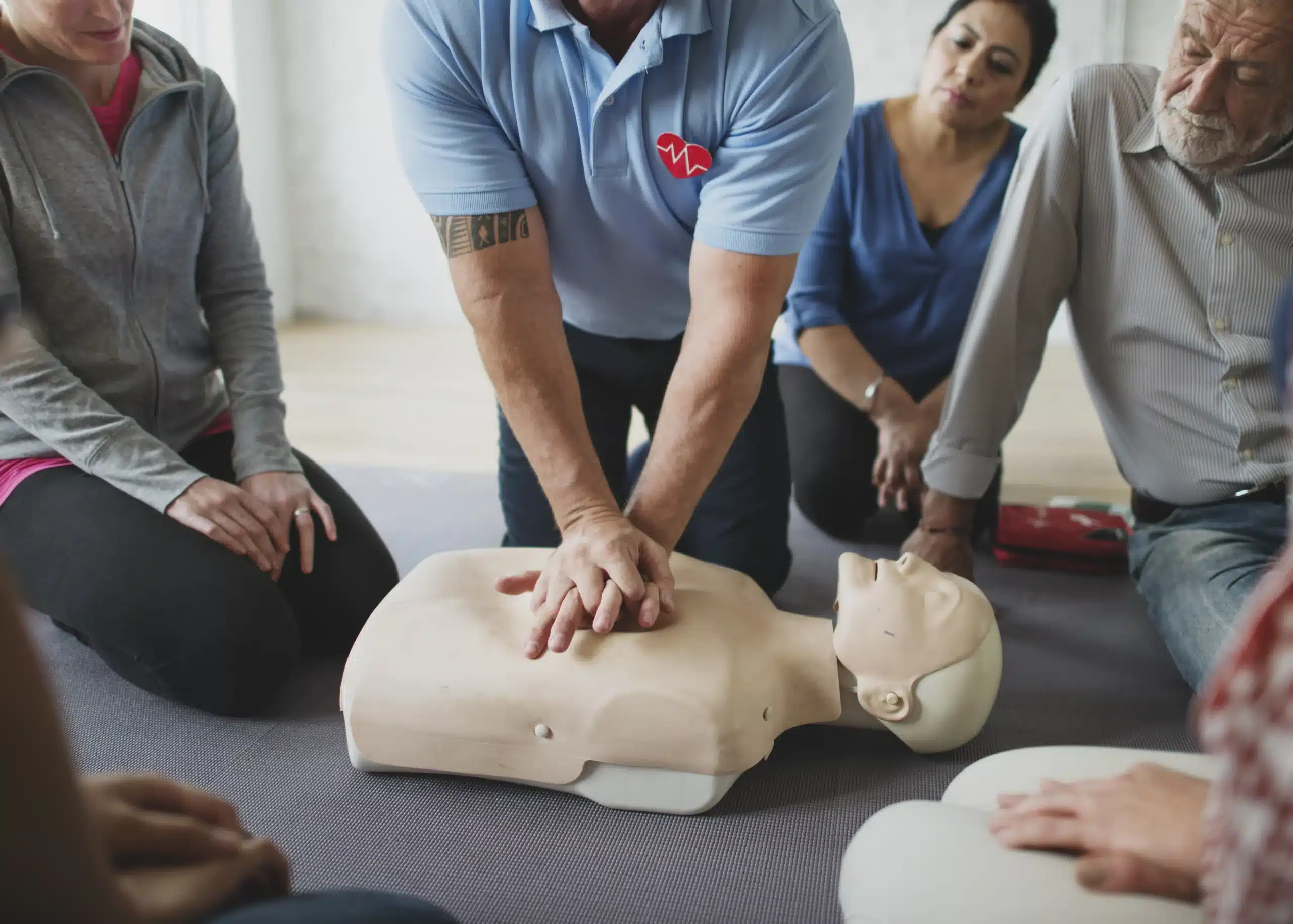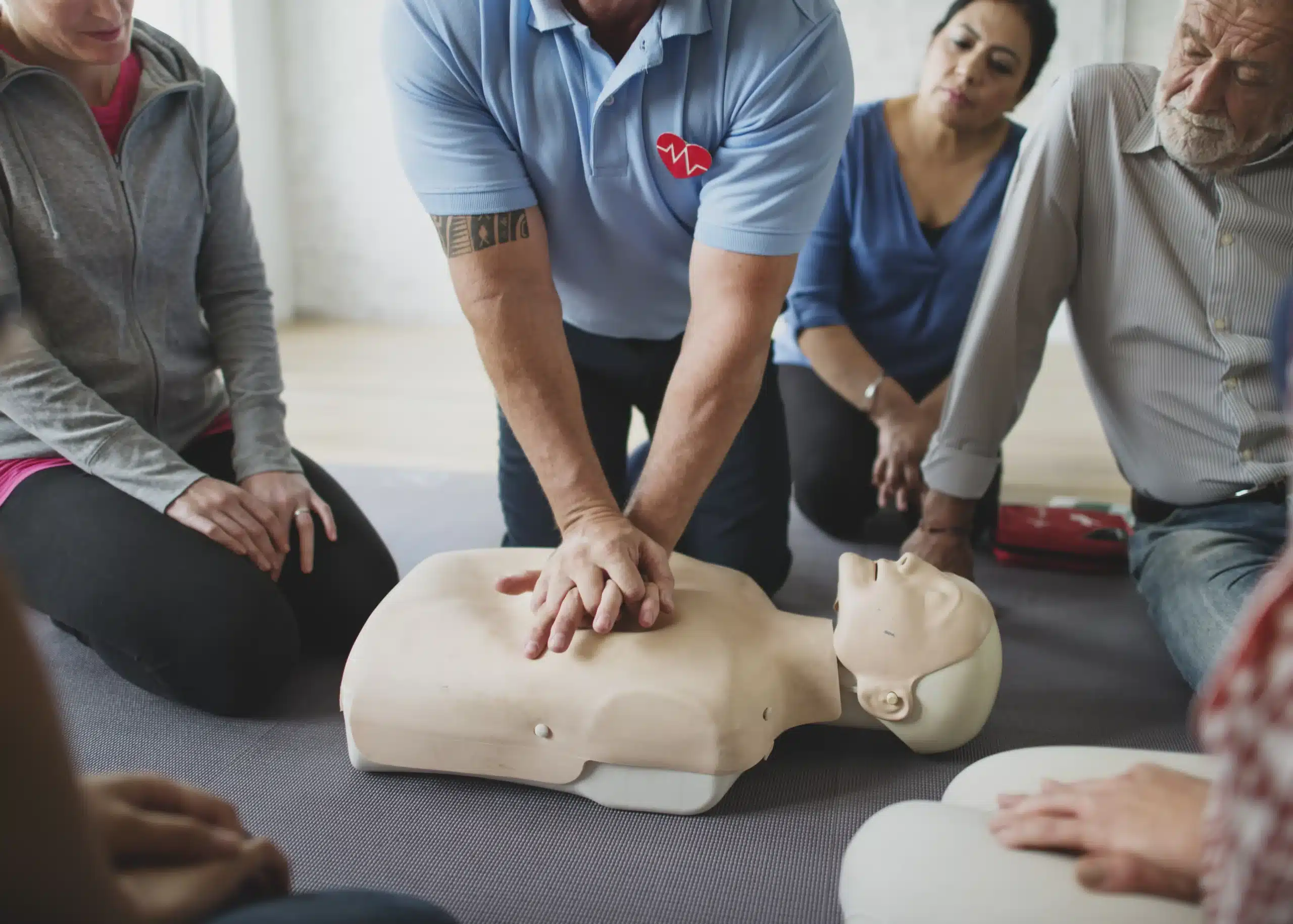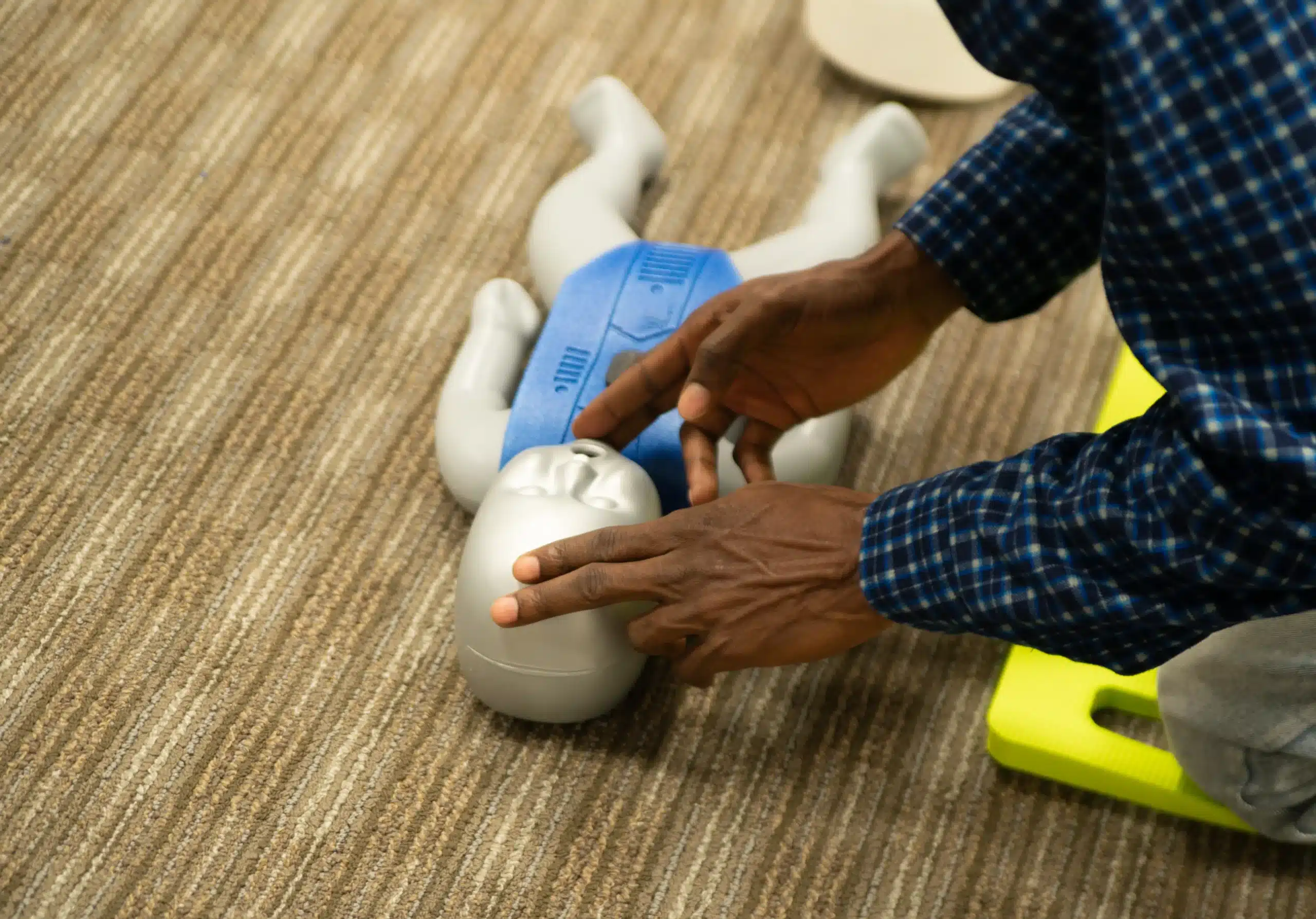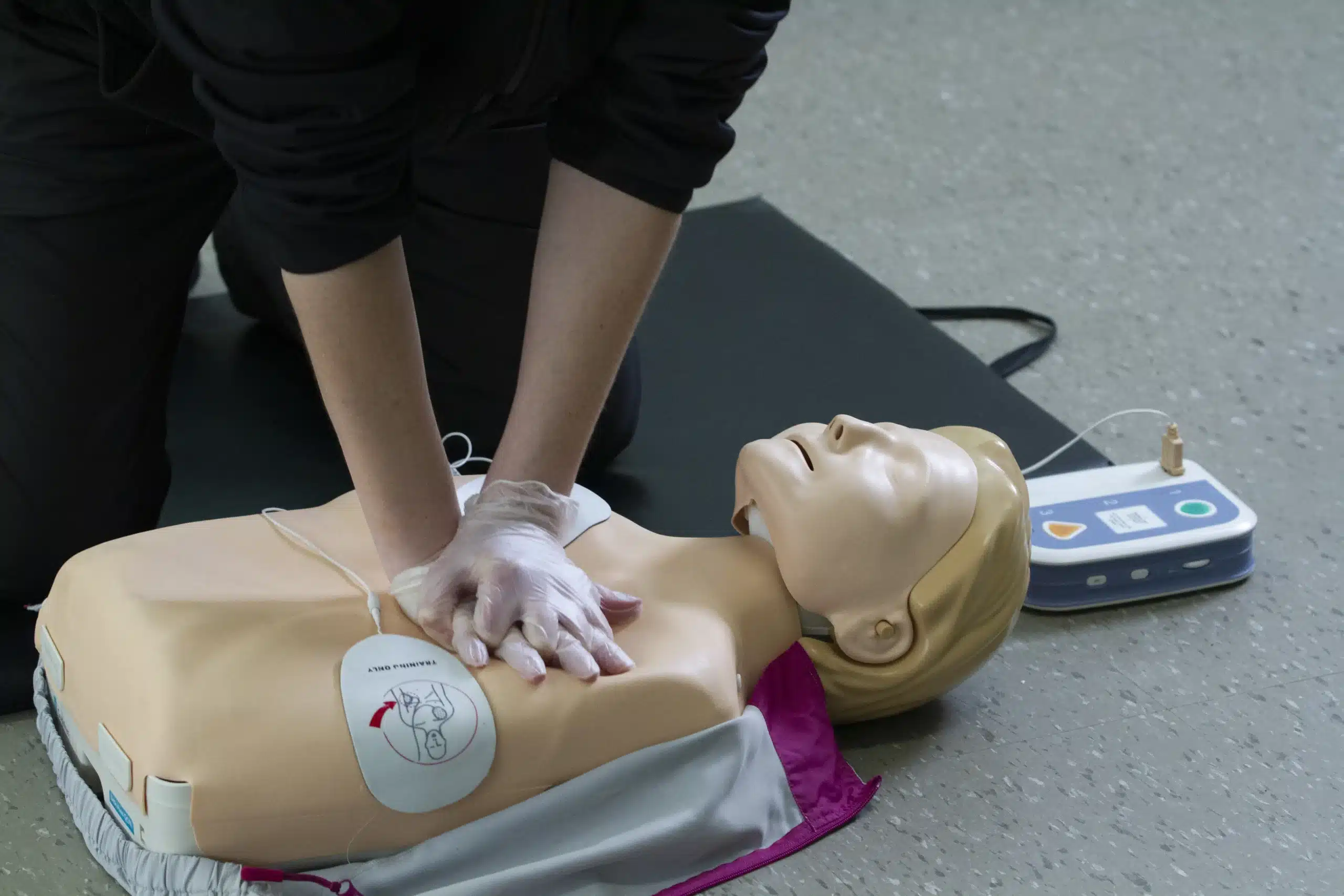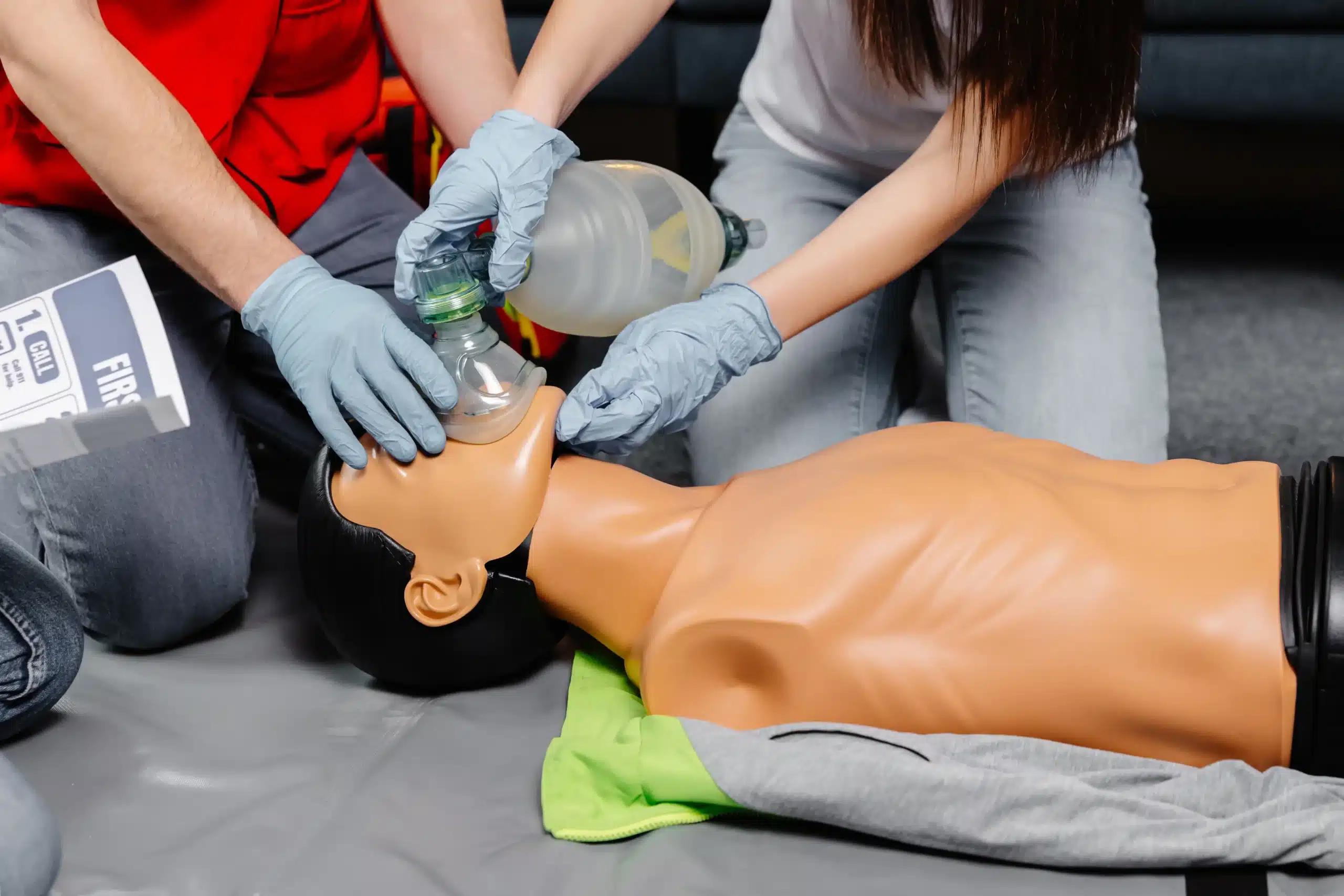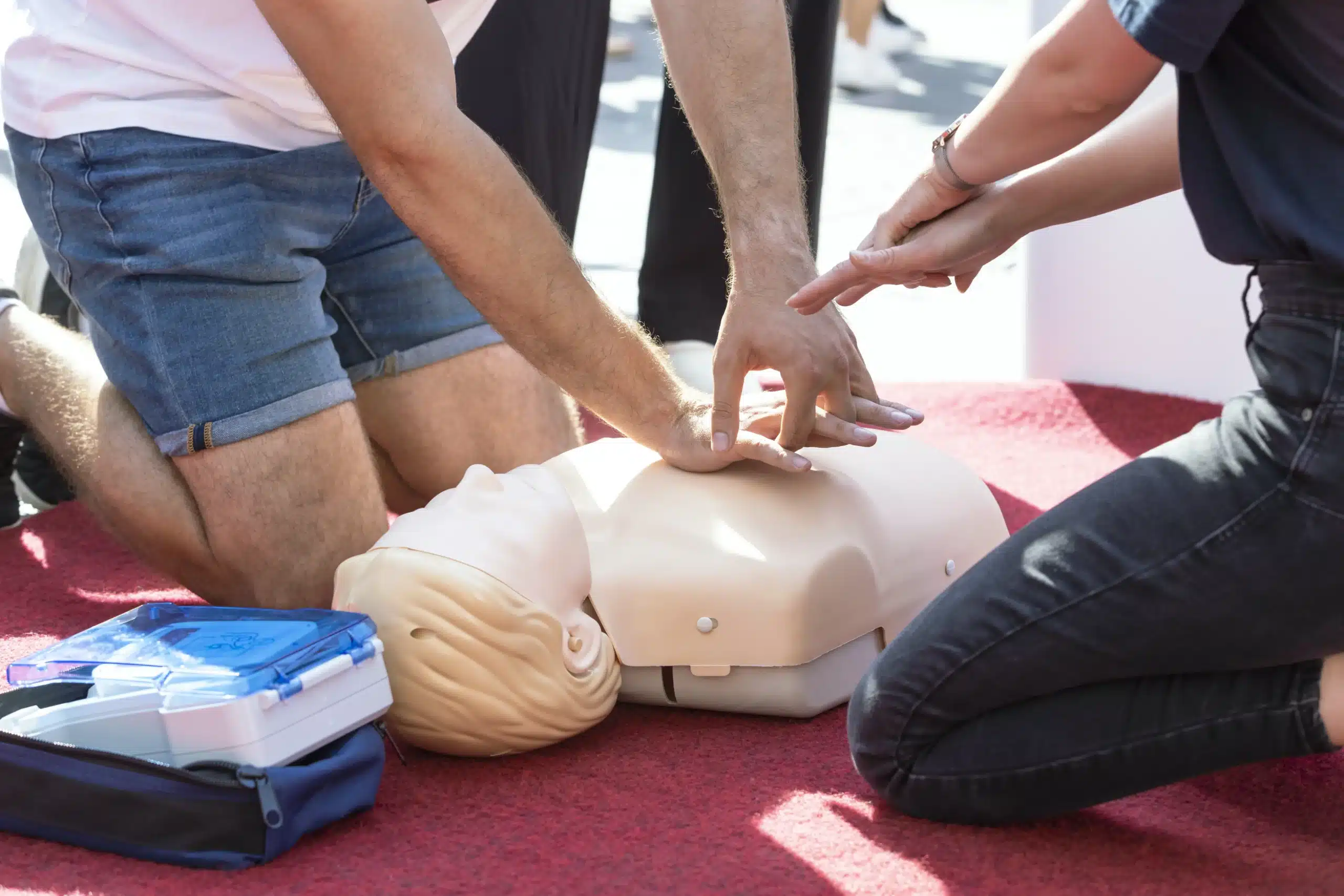Faced with a medical emergency, knowing CPR can transform you from a bystander into a lifesaver. This comprehensive guide demystifies CPR training, covering everything from basic life support techniques to finding the perfect course for your needs. Whether you’re a healthcare professional, a concerned parent, or simply someone who wants to be prepared, we’ll help you understand the different CPR certifications, the importance of hands-on practice, and how to find CPR courses near me. Empower yourself with the skills to make a difference—it could save a life.
Key Takeaways
- CPR training equips you to respond to emergencies: Find the right course, from community-level CPR to advanced healthcare provider certifications.
- Consider key factors when selecting a CPR course: Think about cost, time commitment, the training organization’s reputation, and opportunities for hands-on practice.
- Stay prepared by keeping your CPR skills current: Refresh your knowledge and technique with regular refresher courses and online resources.
What is CPR Training?
CPR, or Cardiopulmonary Resuscitation, is a life-saving technique used when someone’s breathing or heartbeat has stopped. This can happen during a heart attack, near drowning, or a choking incident. CPR involves chest compressions and rescue breaths. The chest compressions circulate blood to vital organs, and rescue breaths provide much-needed oxygen. Learning CPR empowers you to take action that can drastically improve someone’s chance of survival. CPR classes teach you to recognize the signs of cardiac arrest and respond quickly and effectively.
CPR training gives you the skills and confidence to handle these emergencies. These programs teach proper chest compression techniques, how to give rescue breaths, and how to recognize the signs of a cardiac arrest. Many courses also include AED (Automated External Defibrillator) training. Comprehensive programs cover everything from assessing the scene to providing care after CPR. It’s a valuable skill for everyone, especially those in healthcare, education, or childcare. Knowing CPR allows you to be a resource for your family, friends, and community. Find a local CPR class to become equipped and ready to help in an emergency.
CPR Course Options
Knowing which CPR course is right for you can feel overwhelming. This section breaks down the different types of CPR training, from basic life support for the community to advanced certifications for healthcare professionals. Whether you’re a parent, teacher, or medical worker, we’ll help you find the right fit.
CPR for Everyone
Everyone can benefit from learning CPR. It equips you to respond effectively during emergencies and could save a life. Basic CPR and First Aid certification covers essential techniques like chest compressions, rescue breaths, and how to recognize the signs of a heart attack or stroke. These courses are ideal for community members, teachers, coaches, parents, and anyone who wants to be prepared. Campbell CPR Classes offers a range of AHA-certified courses designed to meet different needs and schedules.
CPR for Healthcare Providers
Healthcare providers, including doctors, nurses, paramedics, and other medical professionals, need a more advanced level of CPR training. The BLS course for healthcare providers covers advanced airway management, team dynamics, and using an AED. Campbell CPR Classes is a woman-owned AHA Training Center committed to providing high-quality instruction and competitive pricing. Their Low Price Guarantee ensures you’re getting the best value.
Specialized CPR
Beyond basic and healthcare provider CPR, specialized certifications exist for specific situations. These include Pediatric Advanced Life Support (PALS) for those working with infants and children, and Advanced Cardiovascular Life Support (ACLS) for advanced medical professionals. Campbell CPR Classes offers these specialized courses, along with other certifications like NRP and EMSA Child Care Health & Safety training. For larger groups, discounted rates are available for group CPR classes. Contact them to learn more or schedule a class. They also offer convenient RQI classes.
CPR Certification Costs
Knowing the cost of CPR certification is a practical first step. CPR course fees vary, so understanding what influences pricing can help you find the best value.
Typical Prices
Basic CPR and CPR/AED training usually starts around $45. Expect to pay more for advanced certifications like ACLS (Advanced Cardiovascular Life Support) or PALS (Pediatric Advanced Life Support) due to the specialized nature of these courses. These advanced courses are geared towards healthcare providers and involve more comprehensive training. For those seeking basic CPR certification, online options can be a more affordable starting point.
Factors Influencing Cost
Several factors affect how much a CPR class costs. Location plays a role, as prices can differ between cities and training centers. The type of course also matters. A basic CPR course for the general public will typically be less expensive than a specialized course like CPR for healthcare providers. Also, the inclusion of additional certifications, such as First Aid or AED training, can influence the overall cost. Finally, the organization providing the training (American Heart Association, American Red Cross, etc.) may also have its own pricing structure.
Discounts & Group Rates
If you’re looking for ways to save on CPR training, explore discounts and group rates. Many providers offer reduced prices for group bookings, making it a cost-effective option for workplaces, community groups, or families. Campbell CPR Classes, for example, specializes in providing discounted group rates. Be sure to ask about any available discounts, as some training centers offer special rates for students, seniors, or other groups. Taking the time to compare prices and explore discount options can help you find affordable, high-quality CPR training that fits your budget.
Time Commitment & Certification Validity
Knowing the time commitment and how long your certification remains valid is key when choosing a CPR course. This section breaks down what you can expect, so you can plan accordingly.
Course Length
CPR course length depends on the type of training you need. A basic CPR course typically lasts between two and four hours. More advanced courses, such as ACLS, may involve online learning components (3–4 hours) followed by shorter in-person skills sessions (around 40 minutes). Factor in any pre-course study or online modules when estimating your total time commitment. For those looking for a comprehensive guide to ACLS renewal in Campbell, check out this helpful resource.
How Long Certification Lasts
Most CPR certifications remain valid for two years. This includes basic CPR and often other certifications like BLS. Keeping track of your certification’s expiration date is essential to ensure your skills are current and you’re prepared for any emergency. Mark your calendar or set reminders so you know when it’s time to recertify.
Recertification
Renewing your CPR certification is crucial for maintaining your skills and ensuring you’re prepared to respond effectively in an emergency. Recertification courses cover updates to guidelines and best practices, keeping your knowledge fresh. Consider exploring the various CPR renewal courses offered by Campbell CPR Classes, including BLS, ACLS, PALS, and First Aid, to stay up-to-date. For a deeper understanding of CPR certification validity and renewal, this guide offers valuable insights.
Qualified Instructors & Training Organizations
Finding the right CPR instructor and training organization is crucial for a valuable learning experience. This section helps you understand what to look for when making your decision.
Choosing a CPR Instructor
A qualified CPR instructor should be certified by a recognized organization like the American Heart Association (AHA) or the American Red Cross. Look for instructors with extensive experience, not just in teaching, but also in practical application. A good instructor creates a comfortable learning environment, answers questions thoroughly, and provides personalized feedback. Consider checking reviews and testimonials to get a sense of an instructor’s teaching style and effectiveness. Campbell CPR Classes, for example, is a woman-owned AHA Training Center known for its excellent customer service and commitment to providing high-quality instruction. Don’t hesitate to reach out to different instructors or training centers to discuss your specific needs and preferences before committing to a course.
Accreditation & Standards
Ensure your chosen course adheres to nationally recognized standards. AHA-certified courses guarantee your training meets industry standards and is widely accepted by employers and licensing bodies. Organizations like the AHA and Red Cross provide comprehensive training programs covering essential CPR techniques and life-saving skills. Accreditation matters, as it ensures the curriculum is up-to-date and aligned with the latest scientific guidelines. Campbell CPR Classes offers a range of AHA-certified courses, including BLS, ACLS, PALS, and First Aid, ensuring you receive high-quality training that meets these important standards. Whether you’re a healthcare professional or seeking general CPR knowledge, choosing an accredited program ensures you receive reliable and effective training.
Find a CPR Course Near You
Finding the right CPR course requires a little research. Think about your schedule, budget, and learning style. Whether you prefer online convenience or in-person instruction, there’s a CPR class out there for you.
Online Search
Online CPR training offers flexibility and convenience. You can learn the basics at your own pace, fitting the coursework around your schedule. Many online CPR courses combine online learning with in-person skills practice, ensuring you get hands-on training with a certified instructor. For more information, check out our guide to online CPR classes in Campbell.
Local Resources
Reach out to your local community centers, hospitals, or fire departments. These organizations often offer CPR courses. For residents of Campbell, San Jose, and Cupertino, Campbell CPR Classes provides a range of AHA-certified courses at competitive prices. For additional options in the Campbell area, check with organizations like Safety Training Seminars.
Comparing Courses
When comparing courses, consider factors like cost, certification type, and the overall learning experience. The American Heart Association (AHA) and the American Red Cross are two well-respected organizations offering CPR certification. While both provide excellent training, their programs might differ slightly in content and cost. Basic online CPR courses can start as low as $45, but more advanced certifications, like ACLS or PALS, typically come at a higher price point. If you’re signing up with friends, family, or colleagues, ask about group discounts. Our low price guarantee ensures you’re getting the best value for your training. Have questions? Contact us.
Prepare for Your CPR Course
Getting ready for your CPR class doesn’t have to be stressful. A little preparation goes a long way toward a smooth and productive learning experience. Here’s what you need to know:
What to Pack
Keep it simple. You won’t need much for your CPR course, but having a few essentials will make your day easier. Bring a notebook and pen to jot down key takeaways and reminders. Dress comfortably—you’ll be actively participating in hands-on practice. And don’t forget your ID and registration confirmation. Having these items ready will minimize distractions and allow you to focus on learning these vital lifesaving skills.
What to Expect
A typical CPR course covers the latest techniques and guidelines endorsed by organizations like the American Heart Association. Expect a blend of theoretical knowledge and practical skills training. You’ll learn how to perform CPR on adults, children, and infants, and how to use an AED (Automated External Defibrillator). Campbell CPR Classes structures its courses to be interactive, with plenty of opportunities for hands-on practice. This approach helps build confidence and ensures you’re comfortable applying your new skills in a real-world scenario. For specifics, take a look at our BLS course information.
Pre-Course Study
Want to get a head start? Consider some pre-course study. Online CPR training can introduce you to the core concepts before your in-person session. This blended learning approach combines the convenience of online learning with the essential hands-on practice you’ll get in class. Reviewing any materials provided by your training center can also reinforce your understanding. Even a little prep work can make a big difference in how quickly you grasp the techniques.
Hands-On CPR Practice: Why It Matters
While online CPR training offers flexibility and convenience, it’s crucial to pair it with hands-on practice. This blended approach ensures that you not only grasp the theory behind CPR, but also develop the muscle memory and confidence to perform it effectively in a real emergency. Think of it like learning to drive—you wouldn’t just read the driver’s manual and then hit the freeway. You need to get behind the wheel and practice.
Hands-on training reinforces the techniques and helps you retain them longer than passive learning methods. Studies show that actively engaging with the physical steps of CPR improves recall, preparing you to respond quickly and efficiently under pressure. In those critical moments, you’ll be able to draw on your training without hesitation. For residents of Campbell, San Jose, and Cupertino, Campbell CPR classes offer the hands-on training you need.
Plus, hands-on CPR courses often incorporate simulations and realistic scenarios that mirror actual emergencies. This immersive experience is invaluable for building confidence and honing your decision-making skills. You’ll learn to assess the situation, make quick judgments, and act decisively when it matters most. Realistic training bridges the gap between theory and practice, making you truly prepared for real-world emergencies.
Finally, in-person practice allows instructors to give you immediate feedback and correct any mistakes. This personalized guidance is essential for mastering proper CPR techniques. They can observe your form, offer adjustments, and answer your questions in real-time, ensuring you’re performing CPR correctly and effectively. This level of individual attention is hard to replicate in a purely online setting. For CPR classes in Campbell, contact us today.
Maintain Your CPR Skills
CPR is a lifesaving skill, but like any skill, it gets rusty without practice. Staying current on the latest techniques and guidelines is crucial for providing effective care in an emergency. Regularly refreshing your CPR skills ensures you’re always prepared to act quickly and confidently when it matters most.
Refresher Courses
The best way to keep your CPR skills sharp is by taking refresher courses. These courses are shorter than initial certification courses and focus on reinforcing essential techniques and updating you on any changes in guidelines. The Red Cross emphasizes the importance of current first aid knowledge and offers various learning and recertification options. Your CPR certification is typically valid for two years, and renewal is usually straightforward with a short training session, like the ones offered by the Red Cross CPR program. Campbell CPR Classes offers a range of AHA-based CPR renewal courses, including BLS, ACLS, PALS, and First Aid, making it easy to stay current.
Online Resources
Online resources can be valuable tools for maintaining your CPR skills between refresher courses. Online CPR training offers a flexible way to review key concepts and procedures. Combining online learning with in-person practice provides a well-rounded approach. However, it’s essential to ensure any online CPR certification you pursue is from a reputable organization accredited by the American Heart Association (AHA) or the American Red Cross (ARC). Employer acceptance of online-only CPR certifications varies, so always check their requirements. Confirming your employer’s certification requirements ahead of time will help you choose the right course.
CPR Training Providers
Finding the right CPR training provider is key to receiving high-quality instruction and a recognized certification. Several respected organizations offer CPR training, each with its own approach and course options. Let’s take a look at some of the leading providers:
American Heart Association (AHA)
The American Heart Association is a well-known authority on CPR training and research. They offer a range of courses, from Basic Life Support (BLS) for healthcare providers to Heartsaver courses for the general public. AHA certifications are widely accepted and respected. For those located in or near Campbell, you can find more information on local BLS courses through Campbell CPR Classes.
American Red Cross
The American Red Cross is another prominent provider of CPR training. They offer various courses, including CPR/AED/First Aid training and specialized courses for lifeguards and other professionals. The Red Cross provides both in-person and online learning options, making their courses accessible. For those seeking CPR renewal, Campbell CPR Classes offers a helpful guide.
National Safety Council (NSC)
The National Safety Council offers CPR and first aid training programs. Their courses cover various topics, including adult, child, and infant CPR, AED use, and basic first aid. The NSC focuses on practical skills and real-world scenarios. They also have a helpful CPR training overview available online.
American Safety & Health Institute (ASHI)
The American Safety & Health Institute provides CPR, first aid, and other safety training programs. ASHI courses are designed to meet OSHA requirements and other industry standards. They offer various certification options, including CPR/AED/First Aid combination courses and specialized training. More information on their CPR and first aid training can be found on their website.
ProTrainings
ProTrainings offers online CPR certification courses. Their online format allows students to complete the coursework at their own pace. ProTrainings courses cover essential CPR skills and provide certification upon completion. You can explore their CPR certification options online.
CPR Today
CPR Today offers various CPR and first aid training courses, including options for initial certification and renewal. They focus on providing engaging and interactive training. CPR Today offers courses for both individuals and groups. You can find an overview of their training programs on their website.
Campbell CPR Classes
Campbell CPR Classes is a woman-owned American Heart Association Training Center offering various AHA certification courses, including BLS, ACLS, PALS, CPR, and First Aid. They are committed to providing high-quality training at competitive rates and offer a Low Price Guarantee. They provide discount group classes and flexible scheduling. Serving San Jose, Campbell, and Cupertino, they prioritize excellent customer service. You can contact them to learn more. For those interested in RQI classes, they also offer RQI training. They have published a helpful guide covering everything you need to know about CPR classes in Campbell.
Related Articles
- CPR Certification in San Jose: Your Complete Guide – Campbell CPR Classes
- CPR Courses in Cupertino: Find the Right One For You – Campbell CPR Classes
- CPR Classes in Cupertino: Your Ultimate Guide – Campbell CPR Classes
- Discounted CPR Classes in Santa Clara County – Campbell CPR Classes
- CPR Renewal in San Jose: Your Complete Guide – Campbell CPR Classes
Frequently Asked Questions
What are the different types of CPR certification available? CPR certifications range from basic life support for the community to advanced certifications for healthcare professionals. Basic CPR/AED courses cover essential techniques for adults, children, and infants. Advanced certifications, such as BLS, ACLS, and PALS, cater to healthcare providers and involve more in-depth training on airway management, team dynamics, and other specialized procedures.
How much does CPR certification cost, and are there any discounts? CPR certification costs vary depending on the course type, location, and training provider. Basic CPR courses typically start around $45, while advanced certifications like ACLS and PALS are more expensive. Many providers offer discounts for group bookings, so be sure to inquire about group rates if you’re registering with others. Some training centers also offer discounts for students, seniors, or other specific groups. Campbell CPR Classes offers a Low Price Guarantee, ensuring competitive pricing for their courses.
How long does it take to get CPR certified, and how long is the certification valid? The time commitment for CPR certification depends on the course level. Basic CPR courses usually take a few hours to complete, while more advanced courses may require a longer time commitment due to additional modules and skills practice. Most CPR certifications are valid for two years. It’s essential to keep track of your certification’s expiration date and renew it promptly to maintain your skills and preparedness.
What should I expect during a CPR class? CPR classes typically involve a combination of theoretical instruction and hands-on practice. You’ll learn how to recognize the signs of cardiac arrest, perform chest compressions and rescue breaths, and use an AED. Expect interactive sessions with demonstrations, practice scenarios, and personalized feedback from the instructor. Comfortable clothing is recommended, as you’ll be actively participating in hands-on training.
How can I find a CPR class near me? You can find CPR classes through various channels. Online searches can help you locate training providers in your area. Local community centers, hospitals, and fire departments often offer CPR courses. The American Heart Association and the American Red Cross also have websites that can help you find certified training centers near you. For those in the Campbell, San Jose, and Cupertino area, Campbell CPR Classes offers a range of AHA-certified courses.


